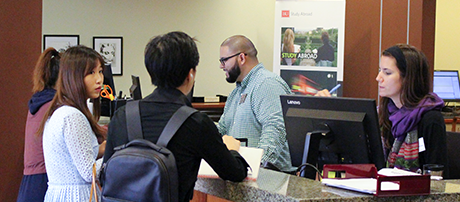The Shanghai Chinese Language & Culture program offers students the opportunity to take courses at our BU Shanghai center and at Fudan University for a semester or an academic year. Fudan is one of China’s leading universities with the second-largest foreign student population in China; it is designed to facilitate immersion into Chinese culture. Students in this program will take an intensive Chinese language course and two electives taught in English. There is no prior language requirement, so Chinese language courses are offered across all levels. During their time in China, students are housed in off-campus program housing located near Fudan’s campus.
Requirements & Considerations
- All students must enroll according to, and remain in compliance with, the Boston University Study Abroad Course Load Policy.
- No prior language study is required
- Students are strongly recommended to apply for their passport by the time they apply to the program
- Admission requirements for all programs
- 16 credits upon successful completion
Curriculum
Required Language Course
All students enroll in one of the following courses, depending on their language level. Each course carries eight credits.
Required Language Course List
- CAS LC 111/112 Beginning Intensive Chinese (8 credits)
- This course fulfills a single unit in each of the following BU Hub areas:
- Individual in Community
- Essentials of structure, oral practice, introduction to the writing system. Recommended for students with no previous coursework in Chinese.
- Syllabus
- This course fulfills a single unit in each of the following BU Hub areas:
- CAS LC 211/212 Intermediate Intensive Chinese (8)
- This course fulfills a single unit in each of the following BU Hub areas:
- Individual in Community
- Global Citizenship and Intercultural Literacy
- Prerequisite: CAS LC 112 Second-Semester Chinese, or the equivalent.
- Review of structure and grammar, practice in conversation and writing, introduction to reading.
- Syllabus
- This course fulfills a single unit in each of the following BU Hub areas:
- CAS LC 311/312 Advanced Intensive Chinese (8)
- This course fulfills a single unit in each of the following BU Hub areas:
- Global Citizenship and Intercultural Literacy
- Prerequisite: CAS LC 212 Fourth-Semester Chinese, or the equivalent.
- Readings in modern Chinese. Readings and discussion in Chinese of selected nonliterary and literary materials, including newspaper articles, short stories, and essays. Regular compositions required.
- Syllabus
- This course fulfills a single unit in each of the following BU Hub areas:
- CAS LC 411/412 Fourth-Year Chinese (8)
- Prerequisite: CAS LC 312 Sixth-Semester Chinese, or the equivalent.
- Focuses on improving reading and writing skills through an understanding of Chinese culture and social realities.
- Syllabus
Elective Courses
Students enroll in two of the following courses.The schedule and course offerings vary each semester. Students will receive further information on these elective courses upon arrival in Shanghai.
Elective Courses List
- China’s Population and Development (4)
- China has been undergoing two exceedingly rapid transformations in the past half a century: a demographic transition with dramatic decrease in fertility and mortality, and an economic transition from a planned economy to a market economy. The compressed demographic transition has made China a country with a very low population growth rate and accelerating population aging, and unprecedented economic reform has lifted China to the ranks of middle-income countries. This course aims to introduce basic concepts and theories in demography, discuss the interconnection between demographic change and socioeconomic transformation, and also explore the socioeconomic consequences of population policies in China.
- spring only
- Syllabus
- Culture and Health (4)
- This course examines health and illness from a cultural perspective. Specifically, we will analyze the social meanings associated with health and illness, medical knowledge production, medical decision-making, and global health in cross-cultural contexts. The students will have a chance to delve into issues related with the social processes of framing illness, the medicalization of life, the complexity and uncertainty surrounding medical decisions, and the cultural aspects of health practices across the globe.
- spring only
- Syllabus
- Doing Fieldwork in China (4)
- This course aims to situate students' fieldwork experiences within a framework of the local social contexts to provide students with conceptual and methodological tools for approaching their field placements; to evaluate their own experiences and observations through critical reflection; Anthropology provides a new language, a set of technical concepts, and a new methodological toolkit that will hopefully help you better observe, describe and understand the local social world around you. In learning the anthropological perspective, I hope that you develop a critical, even “skeptical” view toward superficial explanations of human behavior by replacing your common-sense understandings of social interaction with an uncommon sense about the structure and process of social life. As we learn about cultural anthropology as a social science we will learn to discriminate between reasonable and unreasonable generalizations made on the basis of limited evidence.
- spring only
- Syllabus
- Development Studies (4)
- This course will guide students in developing social research skills in real-life topics. By taking this course, students will learn different procedures of social research methods. Also, by applying one or several research methods in studying a substantive question, students are expected to accumulate first-hand experience in social science studies. In this process, they also garner a better understanding of Chinese society.
- fall only
- Syllabus
- Introduction to Chinese Society (4)
- This course aims to familiarize students with a number of themes about Chinese society. As the rapid development and comprehensive social transition in China has increasingly been a global focus, it is necessary to better understand the social, cultural and political forces that underpin China’s unique development trajectory and the current situation. In turn, such an understanding further calls for a process of learning an array of key notions and conceptual tools that will be methodically introduced and explicated throughout the semester.
- Syllabus
- Psychology and Life (4)
- This course is offered to any undergraduate students interested in the science of psychology. The course embraces the vision of American Psychological Association (APA), “to advance the creation, communication and application of psychological knowledge to benefit society and improve people’s lives” (www.apa.org). Therefore, students are encouraged to apply what they have learned from the course to enhance the quality of their lives as well as the lives of others if possible. Moreover, as the name of the course suggests, it is hoped that by the emphasis of a cross-cultural perspective in teaching, students may develop the sensitivity as well as the appreciation for diversity in human lives, and therefore embrace a more open and tolerant attitude towards themselves and others.
- fall only
- Syllabus
- Religion in Chinese Society (4)
- This course is designed to introduce students to the sociological study of religion in traditional Chinese society and the late modern world. The purpose of this course is to explain differing perspectives in understanding the significant role of Chinese religion in both the traditional and contemporary world. Discussion will focus on the similarities and contrasts in the dynamics of modernization as experienced in China and in the West, especially those spiritual convictions that lie at the heart of the Chinese heritage of popular belief and practice.
- Syllabus
- Social Capital Research (4)
- This course provides an overview of social capital research and its implication for individual mobility and social support. Topics covered in this class include the different schools of social capital, its individual and collective roots, how it relates to social support and individual health, as well as its application for contemporary economic and social life.
- fall only
- Syllabus
- Theory and Reality: Population Migration in China (4)
- As one of the most populous countries in the world, China has experienced a rapid increase in its rural migrant population since the early 1980s, when the reform of the household registration (hukou) system was on the agenda. Due to the large number of rural laborers leaving the countryside to work in urban areas, China has undergone the largest and fastest urbanization in the world. This course starts from introducing the evolution of spatial patterns of internal migration and reasons for migration; and tries to illustrate the characteristics and wellbeing of the migrants; finally evaluates the impacts of the migration on urbanization and regional development.
- Syllabus
Housing & Student Services
- Double room with private bath and mini fridge in room
- Shared kitchen, washer, and dryer in the building
- Board is not included; no stipend is provided
- Students can eat at Fudan’s dining hall at an additional cost
- Each unit has Ethernet connections (Wi-Fi routers provided as well); AC/heater unit
- Limited single rooms may be available for an additional charge.
Program Dates
- Fall Semester: late August to late December
- Spring Semester: early February to mid June
Application Timeline
This program follows rolling admissions and may fill before the official deadline.
Fall Semester
- Applications Open December 15
- Applications Deadline March 15
Spring Semester
- Applications Open June 1*
- Applications Deadline October 1
This program is rolling admissions; applications are reviewed once all application materials are received, prior to all deadlines. It is the student’s responsibility to ensure that all required materials are received by the BU Study Abroad office. Students are encouraged to apply as early as possible as some programs and internship tracks have limited space and may fill up before the deadline. Submitting a complete application prior to the application deadline, does not guarantee acceptance. Students will be emailed an admissions decision within three weeks of a completed application.
Information for BU Students Awaiting an Admissions Decision and exceptions to the standard admission calendar for all students can be found here.
Cost & Financial Considerations
- 2024/2025 Tuition & Fees: $39,834 per semester
Cost includes tuition, housing, program related activities, administrative fee, overseas medical insurance, and emergency evacuation coverage. - Estimated program budget, including cost of living expenses.
- Grants and Scholarships available



